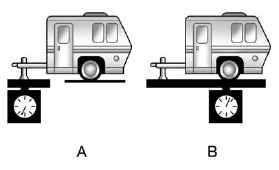Weight of the Trailer Tongue
The tongue load (A) of any trailer is an important weight to measure because it affects the total gross weight of the vehicle. The Gross Vehicle Weight (GVW) includes the curb weight of the vehicle, any cargo carried in it, and the people who will be riding in the vehicle.
If there are a lot of options, equipment, passengers or cargo in the vehicle, it will reduce the tongue weight the vehicle can carry, which will also reduce the trailer weight the vehicle can tow. If towing a trailer, the tongue load must be added to the GVW because the vehicle will be carrying that weight, too.
See Vehicle Load Limits for more information about the vehicle's maximum load capacity.

For a weight-carrying hitch, the trailer tongue (A) should weigh 10 to 15 percent of the total loaded trailer weight (B).
After loading the trailer, weigh the trailer and then the tongue, separately, to see if the weights are proper. If they are not, adjustments might be made by moving some items around in the trailer.
See also:
SERVICE PARK BRAKE
For vehicles with the electric parking
brake, this message displays if a
problem is detected with the electric
parking brake system. See your
dealer for service. ...
DIC Operation and Displays
The DIC has different displays which can be accessed by using the DIC
buttons on the turn signal lever located on the left side of the steering
wheel. The DIC displays trip, fuel, vehicle system inf ...
Rear Window Wiper/Washer
The rear wiper control is located on the turn and lane-change lever.
To turn the rear wiper on, slide the lever to a wiper position.
(Off): Turns the wiper off.
(Rear Wiper Delay): Turns on the
...






